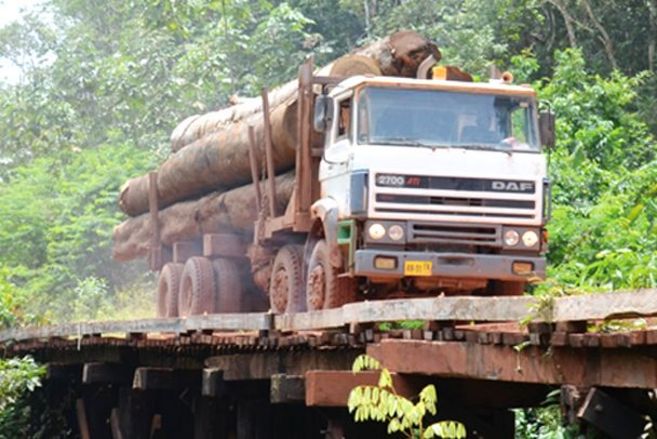Project
Deforestation-free and legal supply chains

Deforestation-free and legal supply chains - Feasibility and impact of the EU Regulation on Deforestation-Free Supply Chains (EUDR)
The new EU Regulation to curb trade in products linked to deforestation, forest degradation and illegality (short: EUDR) was adopted in May 2023. The present project supports the political negotiations and implementation process of the EU regulation and assesses the implementation challenges and impacts for market participants, control authorities and producers.
Background and Objective
The destruction and degradation of forests worldwide is being driven by forest conversion to agricultural land, unsustainable forest management and illegal logging. Forest destruction has far-reaching environmental, economic and social consequences. The EU has recognized its indirect but critical role in deforestation and forest degradation, which is driven by EU consumption of raw materials whose production can threaten forests.
The EU has launched numerous initiatives to assist third countries in combating illegal logging and related trade, and in combating deforestation. As a demand-side environmental trade instrument, the EU first adopted the EU Timber Regulation (EUTR) in 2010 and then the EU Regulation on Deforestation-Free Supply Chains (EUDR) in 2023. The EUDR aims to ensure that only deforestation-free, degradation-free and legal products are available on the EU market.
EU companies that import and trade timber and timber products, as well as products made from the agricultural commodities soy, palm oil, coffee, cocoa, rubber, or cattle, must ensure that the traded products are not harmful to forests by auditing their supply chains according to the due diligence principle.
Target Group
Policy, science, stakeholders affected by the EUDR (market participants, control authorities, producers)
Approach
We address current issues from the negotiation context and implementation process and prepare working papers, policy briefs and journal articles based on existing literature and data.
Our Research Questions
We analyze the feasibility and challenges of the EU regulation to curb trade in products associated with deforestation, forest degradation and illegality.
What are the impacts of the EU regulation for companies and control authorities? Are the EUDR requirements implementable for them, and what are the associated burdens? How can operators’ compliance be assessed and monitored?
Can the EUDR be effective and efficient in reducing deforestation, forest degradation in producer countries and the trade of illegal products? How can its impacts be measured? And what are the implications for the timber market? How could the instrument be improved?
Are there improvements compared to the predecessor regulation EU Timber Regulation (EUTR)? And is the EUDR coherent with other EU policies and international frameworks?
Preliminary Results
Project Briefs:
- EU-trade in wood-based products – coverage by EUTR and EUDR. Project brief 2022/39a (EN) Köthke, Weimar: DOI:3220/PB1667295742000
Links and Downloads
- Thünen Centre of Competence on the Origin of Timber: Expertise
- Thünen Earth Observation: Deforestation and Restauration
Projects:
Thünen-Contact

Involved Thünen-Partners
Duration
1.2022 - 12.2030
More Information
Project status:
ongoing
Publications
- 0
Köthke M, Lippe M, Elsasser P (2024) Ein Vergleich von EUTR und EUDR : im Hinblick auf Unternehmen und Kontrollbehörden sind einige Auswirkungen zu erwarten. Holz Zentralbl 150(20):338-339
- 1
Köthke M, Lippe M, Elsasser P (2023) Comparing the former EUTR and upcoming EUDR: Some implications for private sector and authorities. Forest Pol Econ 157:103079, DOI:10.1016/j.forpol.2023.103079
- 2
Köthke M, Weimar H (2022) Handel mit holzbasierten Produkten: Abdeckung durch EUTR und die geplante Nachfolgeverordnung. Hamburg: Thünen-Institut für Waldwirtschaft, 1 p, Project Brief Thünen Inst 2022/39, DOI:10.3220/PB1667295381000
- 3
Zhunusova E, Ahimbisibwe V, Sen LTH, Sadeghi A, Toledo-Aceves T, Kabwe G, Günter S (2022) Potential impacts of the proposed EU regulation on deforestation-free supply chains on smallholders, indigenous peoples, and local communities in producer countries outside the EU. Forest Pol Econ 143:102817, DOI:10.1016/j.forpol.2022.102817
- 4
Köthke M, Weimar H (2022) Trade in wood-based products in the EU27 - wood content and coverage by the current EUTR and the proposed regulation on deforestation-free value chains. Braunschweig: Johann Heinrich von Thünen-Institut, 52 p, Thünen Working Paper 193, DOI:10.3220/WP1655114210000








